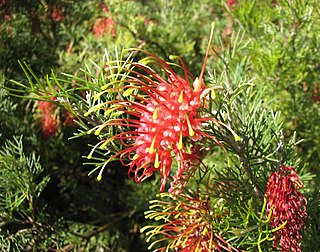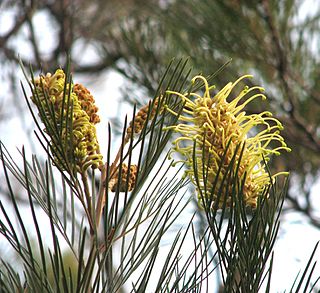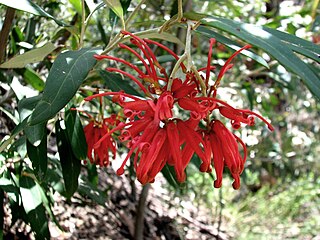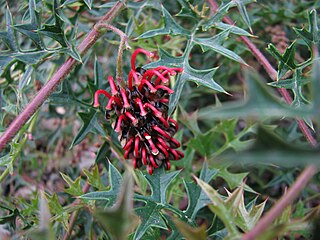
Grevillea thelemanniana, commonly known as spider net grevillea, is species of flowering plant in the family Proteaceae and is endemic to Perth, Western Australia. It is a spreading shrub with linear and pinnatipartite to pinnatisect leaves with linear to narrowly elliptic lobes, and clusters of 6 to 14 pinkish-red and cream-coloured flowers with a red, green-tipped style.

Grevillea vestita is species of flowering plant in the family Proteaceae and is endemic to the south-west of Western Australia. It is an erect, spreading, prickly shrub with lobed leaves, the number and arrangement of lobes depending on subspecies, and more or less spherical to dome-shaped clusters of hairy, white to cream-coloured flowers sometimes tinged with pink.

Grevillea tetragonoloba is species of flowering plant in the family Proteaceae and is endemic to the southwest of Western Australia. It is a dense, erect to spreading shrub, usually with pinnatipartite to almost pinnatisect leaves, the end lobes linear, and clusters of yellowish-brown to fawn flowers with a scarlet to orange-red style.

Grevillea whiteana, also known as Mundubbera grevillea, is species of flowering plant in the family Proteaceae and is endemic to Queensland. It is an erect shrub or small tree with pinnatisect leaves, the lobes linear and more or less parallel, and erect, cylindrical clusters of cream-coloured flowers.

Grevillea curviloba is a species of flowering plant in the family Proteaceae and is endemic to the south-west of Western Australia. It is a prostrate to erect shrub with short branchlets, divided leaves with linear to narrowly lance-shaped lobes with the narrower end towards the base, and white to cream-coloured flowers.

Grevillea victoriae, also known as royal grevillea or mountain grevillea, is a species of flowering plant in the family Proteaceae and is endemic to mountainous regions of south-eastern continental Australia. It is an erect to spreading shrub with elliptic to lance-shaped leaves, and pendulous clusters of red to orange flowers.

Grevillea floripendula, commonly known as Ben Major grevillea or drooping grevillea, is a species of flowering plant in the family Proteaceae and is endemic to a restricted area of Victoria, Australia. It is a spreading, low-lying to prostrate shrub with divided leaves with toothed lobes and clusters of greenish to mauve and blackish flowers with a yellow to red style.

Grevillea steiglitziana, also known as Brisbane Range grevillea, Brisbane Ranges grevillea or Steiglitz grevillea, is a species of flowering plant in the family Proteaceae and is endemic to Victoria, Australia. It is a low, spreading shrub with pinnatifid to pinnatipartite leaves, and greenish-brown flowers with a red style.

Grevillea obtecta, commonly known as Fryerstown grevillea, Elphinstone grevillea or Taradale grevillea, is a species of flowering plant in the family Proteaceae and is endemic to Victoria in Australia. It is a prostrate, clumping or straggling shrub with pinnatifid, pinnatipartite or toothed leaves, and toothbrush-like clusters of light green to yellowish and purplish to black flowers with a dull yellow to pink style.

Grevillea infecunda, commonly known as Anglesea grevillea, is a species of flowering plant in the family Proteaceae and is endemic to a restricted area of southern Victoria in Australia. It is a low-lying to weakly erect shrub with divided leaves with three to sixteen lobes or teeth and greenish-yellow flowers with a dull pink style.

Grevillea celata, commonly known as Nowa Nowa grevillea or Colquhoun grevillea, is a species of flowering plant in the family Proteaceae and is endemic to a restricted part of Victoria in Australia. It is an erect and open to low, dense shrub with oblong, broadly elliptic or linear leaves, and red and yellow, or red, white and apricot-coloured, sometimes all yellow flowers.

Grevillea montis-cole, commonly known as Mount Cole grevillea, is a species of flowering plant in the family Proteaceae and is endemic to central-western Victoria, Australia. It is a shrub with divided leaves with 5 to 15 lobes, the end lobes more or less triangular to narrowly oblong and sharply-pointed, and clusters of greenish to fawn and dull purplish flowers.

Grevillea bedggoodiana, commonly known as Enfield grevillea, is a species of flowering plant in the family Proteaceae and is endemic to a restricted area near Ballarat in Victoria, Australia. It is a prostrate to low-lying shrub with coarsely serrated, egg-shaped to oblong leaves and green and pink flowers.

Grevillea pachylostyla, commonly known as Buchan River grevillea, is a species of flowering plant in the family Proteaceae and is endemic to Victoria in Australia. It is a mounded to almost prostrate shrub with divided leaves, the end lobes triangular, and usually down-curved, more or less toothbrush-like clusters of cream-coloured flowers that turn` pink to red after opening.

Grevillea polychroma , commonly known as Tullach Ard grevillea, is a species of flowering plant in the family Proteaceae and is endemic to eastern Victoria. It is a spreading to erect shrub with densely hairy branchlets, egg-shaped leaves, the narrower end towards the base, and down-turned clusters of hairy, cream-coloured, pale yellow or pink to red flowers.

Grevillea paradoxa, commonly known as the bottlebrush grevillea, is a species of flowering plant in the family Proteaceae and is endemic to the south-west of Western Australia. It is an erect to spreading, prickly shrub with pinnatipartite leaves, the lobes linear, widely spreading and sharply pointed, and with cylindrical clusters of pale to dark pink or cream-coloured flowers with a pinkish-red style.
Grevillea secunda is a species of flowering plant in the family Proteaceae and is endemic to inland Western Australia. It is a spreading shrub with divided leaves, the end lobes cylindrical and sharply pointed, and clusters of pinkish-red flowers with a red style arranged on one side of the floral rachis.

Grevillea spinosa, commonly known as tjiilka-tjiilka, is species of flowering plant in the family Proteaceae and is endemic to inland Western Australia. It is a dense, prickly shrub with mostly pinnatipartite leaves with rigid, sharply-pointed linear lobes, and erect clusters of reddish to blackish green flowers with a bright yellow to orange style.
Grevillea stenostachya is a species of flowering plant in the family Proteaceae and is endemic to the west of Western Australia. It is a compact shrub with pinnatipartite to almost pinnatisect leaves with 3 to 5 lobes, the end lobes cylindrical and sharply pointed, and greenish-white to creamy yellow flowers with a cream-coloured to yellow style.

Grevillea wittweri is a species of flowering plant in the family Proteaceae and is endemic to the southwest of Western Australia. It is a shrub with pinnatipartite leaves, and clusters of greenish to fawn flowers with a crimson style.



















